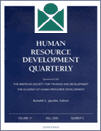I will repeat the abstract:
Creating synergy between research and practice is viewed as the basis for creating successful and meaningful HRD outcomes and is fundamental to the maturation of the profession. Given this, there is naturally an interest in the strength of the relationship between research, theory, and practice, and this has been reflected in the journals of the Academy of Human Resource Development from their inception. In this article, the authors summarize some of the key points from the last 10 years of those journals and put them in the context of research-to-practice experiences in other professions. We conclude that HRD practitioners, practice, and professionals are hampered by the lack of connection between practice and research in the field.
I appreciate the work and support of my co-authors, Darren and Sophia!
 The first article I have published as the lead author just came out in the Winter 2007 issue of
The first article I have published as the lead author just came out in the Winter 2007 issue of